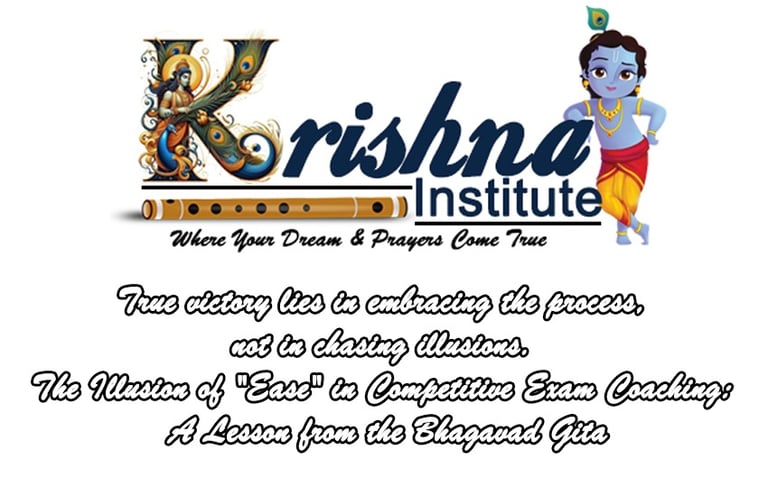True victory lies in embracing the process, not in chasing illusions. The Illusion of "Ease" in Competitive Exam Coaching: A Lesson from the Bhagavad Gita


True victory lies in embracing the process, not in chasing illusions. The Illusion of "Ease" in Competitive Exam Coaching: A Lesson from the Bhagavad Gita
In the world of competitive exams, where the stakes are high and aspirations even higher, coaching institutes often become the go-to solution for parents and students. But amidst genuine efforts to guide students, there’s a growing trend of manipulative marketing tactics—particularly through telephonic promotions. These tactics prey on the vulnerabilities of anxious parents and students, offering a promise that seems almost too good to be true: “Success is easy with us!”
This situation reminds us of the timeless wisdom in the Bhagavad Gita, where Lord Krishna guides Arjuna through his doubts, fears, and illusions on the battlefield. Krishna’s teachings on effort, focus, and embracing challenges are as relevant today as they were then. Uncovering the reality behind these promises and the lessons they hold for us.
The Promise of "Easy Success"
Imagine this: Parents are actively seeking the best opportunities for their child, worried about the rising competition in exams like NEET or JEE. Then comes the call from a coaching institute, filled with confidence and charm:
“Hello! We’ve helped countless students achieve top ranks effortlessly! Your child doesn’t need to stress—our system makes success so simple that even average students outperform toppers. Just trust us, and the results will speak for themselves!”
For parents, overwhelmed with the complexities of the education system, this sounds like a dream come true. Who wouldn’t want their child to succeed without the burden of sleepless nights and endless hard work?
But as Krishna reminds Arjuna in the Bhagavad Gita, one must be cautious of illusions. Success is never a gift handed over freely; it is the result of focused effort, dedication, and perseverance.
The Reality Behind the Curtain
When the student enrolls, reality starts to unfold. The “easy” shortcuts often demand a solid foundation of understanding—something that can only be built through consistent practice and effort. The “secret formulas” work only for those who have already mastered the basics.
This is when disappointment sets in. Students realize that the promises of ease were oversimplified, and parents begin to question why the results don’t match the claims.
As Krishna says in the Bhagavad Gita (Chapter 2, Verse 47):
"You have a right to perform your prescribed duties, but you are not entitled to the fruits of your actions."
This verse reminds us that effort is the only factor within our control. The outcome depends on how sincerely we commit to the process, not on external promises of quick fixes or shortcuts.
How Coaching Institutes Manipulate Through Words
1. Overpromising Results:
Many coaching institutes use words like "guaranteed success" or "effortless learning" to lure parents and students. These claims undermine the reality that competitive exams are designed to test persistence, understanding, and analytical thinking—none of which can be achieved without effort.
2. Creating False Comparisons:
Institutes often share stories of "average students turned toppers," but they rarely disclose the student’s effort, dedication, or unique circumstances. This creates a misleading narrative that success can be achieved without hard work.
3. Preying on Parental Anxiety:
Parents naturally want the best for their children, and these institutes play on their fears of failure. By offering an "easy" solution, they redirect attention from the student’s effort to the institute’s promises.
Lessons from the Bhagavad Gita for Parents and Students
In the Gita, Krishna guides Arjuna to recognize that life’s challenges must be faced with determination and focus. The same applies to competitive exam preparation.
1. Effort is Non-Negotiable:
Success is a result of consistent action. Krishna reminds us that no external force can replace the inner effort required to fulfil one’s dharma.
2. Beware of Illusions:
Just as Krishna helps Arjuna see through his doubts and confusion, parents and students must see through marketing tactics that promise shortcuts to success. Nothing worthwhile comes without perseverance.
3. Focus on the Process, Not Just the Result:
The journey of learning is just as important as the outcome. Krishna advises focusing on one’s duties (effort and preparation) rather than being overly attached to the results.
The Way Forward
Parents and students must approach coaching with clarity and wisdom. Here’s how:
• Ask the Right Questions: Instead of falling for lofty promises, ask the institute about their teaching methods, practice schedules, and student support systems.
• Evaluate Realistically: Look for institutes that emphasize hard work, personalized guidance, and consistent practice, rather than miraculous claims.
• Commit to Effort: Understand that no institute can replace the effort a student must put in. Coaching can guide and support, but the student must do the work.
The Bhagavad Gita teaches us that challenges are an inevitable part of life, but they also provide opportunities for growth. Competitive exams are no different. Success cannot be bought or handed over; it must be earned through dedication and effort.
So, the next time someone promises an “easy path,” remember Krishna’s wisdom: True victory lies in embracing the process, not in chasing illusions. Choose guidance that respects this truth and supports the journey, rather than one that manipulates with empty promises.
Let the Gita’s teachings inspire students to rise above shortcuts and embrace the noble pursuit of knowledge with faith, focus, and perseverance.
Reach Us
Krishna Institute NEET Coaching Centre Trichy
Above ICICI Bank 4th Floor Shri Vari Complex,
36/1 1st Main Road, Ramalinga Nagar, Woraiyur,Trichy
86 80 85 6666
860 854 6666
0431 40 50 266
